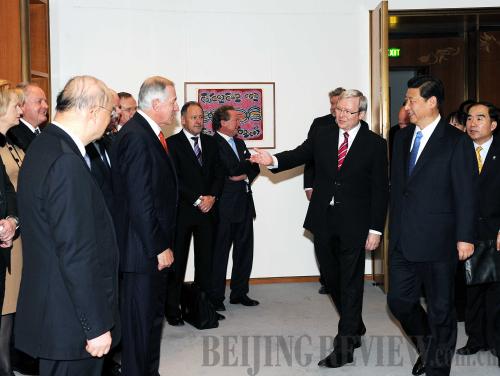| 
Australia's ruling party, the Labor Party, in late June installed a new prime minister and leader. Deputy Prime Minister Julia Gillard, with the support of leaders of major factions within the Labor Party, demanded Prime Minister Kevin Rudd to step down. Given his severe decline in popularity, Rudd decided not to face a ballot and made way for Gillard, who thus became the new leader of the Labor Party and prime minister of Australia, without opposition.
 |
|
STRENGTHENING BUSINESS TIES: Chinese Vice President Xi Jinping meets with Australian entrepreneurs along with then Australian Prime Minister Kevin Rudd in Canberra on June 21 (RAO AIMIN) | This event created several landmarks in Australia's political history. Gillard became the country's first female prime minister. Rudd was Australia's shortest-term prime minister over the past 40 years, and the first elected Labor Party prime minister who did not complete a first term.
The Labor Party's plan was to retain popularity through changing its leader. The party intended to actively push for the introduction and implementation of relevant policies in the new prime minister's honeymoon period with the public, seize an opportunity to dissolve parliament, and hold a general election.
Therefore, it marks the beginning of an electoral campaign between Australia's Labor and the Liberal-National coalition.
The fall of the hero
Rudd was once renowned as a "hero" of the Labor Party. Under his leadership, the party won the 2007 election and regained power after 11 years of John Howard's government. After taking office, Rudd put in place a series of significant actions, including apologizing to indigenous Australians, signing the Kyoto Protocol and carrying out economic stimulus plans to deal with the global financial crisis. All these measures won him an extremely high support from voters. Until the beginning of this year, he was still flying high in the polls.
At that time, Rudd was one of the most popular prime ministers in Australian history, second only to former Labor Prime Minister Bob Hawke.
But, in the past few months, a couple of incidents caused a dramatic slump in his approval rating, falling even lower than opposition leader Tony Abbott, the leader of the Liberal Party. Predictions were that if an election was held, the Labor Party would lose.
Rudd's fall was swift. In late March, Abbott criticized Rudd's lenient policy on refugees and lax border control, which allowed easy asylum for refugees. With a massive influx of refugee boats, the problem once again became a sensitive issue. This provided the opposition with an excuse to attack.
Since Rudd came into power, more than 4,000 illegal immigrants arrived in Australia, of whom only about 140 were repatriated. Rudd's policies found favor with neither voters nor humanitarians. Voters said his policies were too relaxed, while humanitarians said they were still not lenient enough.
Rudd's policy on climate change also dissatisfied voters. After signing the Kyoto Protocol, he went on to ask experts to make proposals on emissions reduction plans. But emissions reduction targets in his climate change bill were not pleasing.
In the meantime, the emissions trading scheme he proposed in order to achieve targets was far from adequate in the eyes of the Green Party and went too far in the eyes of the Liberal Party. It was not approved by parliament.
Following Gillard's suggestion, in April, Rudd decided to shelve the bill until 2012, when developed countries' obligations under the Kyoto Protocol become due. This made the voters even more dissatisfied. Rudd's image in voters' eyes was severely damaged.
Another factor was the Resource Super Profits Tax (RSPT) proposed by Rudd in the state budget 2010-11 in May. The RSPT was to be introduced on July 1, 2012 with a tax rate of 40 percent on profits made from the exploitation of Australia's non-renewable resources.
This resulted in strong resistance from the mining sector and the opposition. Neither the Rudd administration nor the mining sector would concede. As a result, a fierce advertising campaign was conducted.
The tax, which was intended to take from the rich to help the poor, aroused voter discontent. More than half of the voting public were against the tax, holding it would have disastrous effects on investment and employment.
Rudd, who had hoped to win the voters' support through this policy, did not expect it would fail.
When he realized the danger and tried to adjust the policy, his party would not give him the opportunity. Some media blamed this on his style of governance. When Rudd established his cabinet, he had not taken into consideration maintaining a balance among different factions of the Labor Party. Instead, he tried to establish the first non-factional cabinet in Australian political history.
Rudd eventually stood aloof from all factions of the Labor Party. One critic said he could not even be regarded as a member of the Labor Party. He pursued efficiency and confidentiality; therefore, his cabinet had only four core policymakers. Due to the excessive concentration of power, mistakes in policymaking were inevitable.
In an election year, when public support becomes a significant parameter of government performance, it is not difficult to understand his being abandoned by the Labor Party.
| 